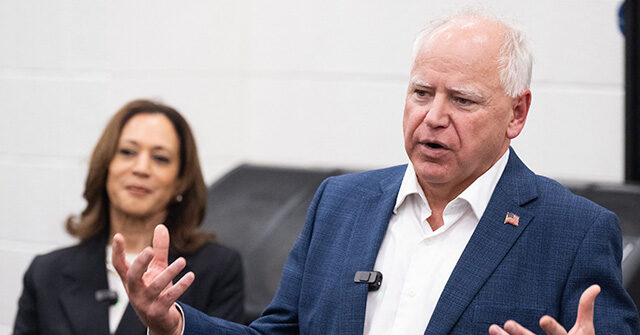During a recent interview with WGAL News 8, Minnesota Governor and 2024 Democratic vice presidential candidate Tim Walz addressed concerns regarding the Biden-Harris administration’s overturning of Trump-era border policies. In response to a question about whether it was a mistake to dismantle these policies, Walz asserted that the current administration’s proposals have been effective in reducing illegal crossings. He claimed that border crossings are now lower than during Trump’s presidency and highlighted the availability of a bipartisan solution developed by conservative Republican senators and Border Patrol agents. According to Walz, the failure to implement this plan stems from Donald Trump’s opposition, suggesting that Trump benefits politically from the ongoing border crisis.
When asked specifically about the high number of illegal crossings reported by U.S. Customs and Border Protection during Biden’s early tenure, Walz emphasized that the administration took proactive steps from day one in office. He reiterated that the depth of the border issue is not as straightforward as it appears, arguing that effective solutions exist but are hindered by Trump’s political maneuvering. He accused Trump of fostering the border crisis to serve his own agenda while spreading misinformation about the situation. Walz’s criticism extended to the broader implications of Trump’s rhetoric, suggesting that it contributes to a divisive political climate.
Walz’s comments also reflect an understanding of the complex dynamics surrounding immigration and border security in the United States. He pointedly acknowledged the bipartisan efforts needed to enact meaningful change in this regard. By mentioning the involvement of conservative figures and Border Patrol agents in crafting potential solutions, Walz illustrates the necessity for coalition-building across party lines to effectively address immigration challenges.
Additionally, Walz directed his criticism not only at Trump but also at Republican leaders who, he claims, are increasingly distancing themselves from Trump’s narrative. He cited instances where Republican mayors and governors have publicly refuted Trump’s assertions about the border crisis, indicating a growing recognition within parts of the GOP that his approach may be out of touch with the realities on the ground. This suggests a fissure within the Republican Party that could have significant implications for future policy debates on immigration.
Walz’s remarks also highlight a broader narrative about accountability in politics. By framing Trump as a self-serving politician uncommitted to resolving critical problems, Walz seeks to illustrate a contrast between Trump’s approach and the Biden administration’s commitment to finding workable solutions. This juxtaposition may resonate with voters who prioritize effective governance over partisan rhetoric.
In conclusion, Tim Walz’s interview serves as a defensive yet assertive articulation of the Biden-Harris administration’s record on immigration. His argument positions the administration as proactive in addressing border issues while holding former President Trump accountable for perpetuating the crisis for political gain. By calling for bipartisan collaboration and criticizing misinformation, Walz aims to reassure voters of the administration’s commitment to serving the public interest amid a contentious political landscape.

